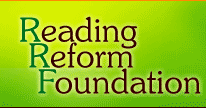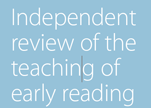






"I use the reading program daily and my students' awareness of phonics has grown tremendously.
They are not only reading with ease but becoming expert spellers as well."
-Mrs. Scott, Phoenix, AZ
"This is the first program I've tried where it seems like there is a real tutor in the house.
The prompting is clear and the tone is very patient and calm."
-D. Lawrence, Philadelphia, PA
|
Research on Learning To Read
"It is widely agreed that reading involves far
more than decoding words on the page.
Nevertheless, words must be decoded if
readers are to make sense of the text."
- Jim Rose, Independent Review of the Teaching of Early Reading
|
Without a doubt, a rich language experience is the foundation which all readers require. Early readers require good listening
and speaking skills before they can start to read. Advanced readers need continual rich language experiences in order to progress
to more advanced reading levels. Together with this rich language experience, a systematic approach to decoding words through
sound/letter relationships is required for readers to succeed. Many classrooms throughout the English-speaking world, as well
as many homes, do an excellent job of providing readers with a quality language experience. The reason why so many readers
struggle, is because a systematic approach to teaching sound/letter relationships is often not nearly as well provided.
Rainglen Reading steps in to fill this gap, ensuring that children are getting daily, systematic, and contextual review of phonics.
|
|
The following are links to national research institutions that support the systematic teaching of letter-sound correspondence
in early reading.
|
  The National Institute for Literacy, a federal agency, provides leadership on literacy issues, including the improvement
of reading instruction for children, youth, and adults. In consultation with the U.S. Departments of Education, Labor,
and Health and Human Services, the Institute serves as a national resource on current, comprehensive literacy research,
practice, and policy.
The National Institute for Literacy, a federal agency, provides leadership on literacy issues, including the improvement
of reading instruction for children, youth, and adults. In consultation with the U.S. Departments of Education, Labor,
and Health and Human Services, the Institute serves as a national resource on current, comprehensive literacy research,
practice, and policy.
|
  For over two years, the National Reading Panel reviewed research-based knowledge on reading instruction and held open panel meetings
in Washington, DC, and regional meetings across the United States. On April 13, 2000, the NRP concluded its work and submitted
"The Report of the National Reading Panel: Teaching Children to Read"
For over two years, the National Reading Panel reviewed research-based knowledge on reading instruction and held open panel meetings
in Washington, DC, and regional meetings across the United States. On April 13, 2000, the NRP concluded its work and submitted
"The Report of the National Reading Panel: Teaching Children to Read"
|
  The Reading Reform Foundation and the debate on how best to teach beginning reading in English-speaking countries.
The Reading Reform Foundation and the debate on how best to teach beginning reading in English-speaking countries.
|
  In 2006 Sir Jim Rose completed his independent review of the teaching of early reading. The review report provided clear
recommendations on what constitutes 'high quality phonics work'.
In 2006 Sir Jim Rose completed his independent review of the teaching of early reading. The review report provided clear
recommendations on what constitutes 'high quality phonics work'.
|
|
|




